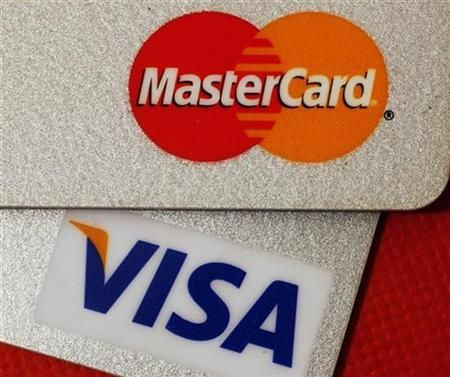Credit Card Debt In U.S.: Falling, But Still Very High

Consumer credit card debt in the U.S. has been edging down in recent years after peaking in July 2008 at $1-trillion (about the size of Mexico’s annual GDP). According to data from the Federal Reserve, as of July 2013, the average indebted household in the U.S. carries credit card debt of $15,325, although that figure is somewhat skewed by a small number of extraordinarily debt-stricken families and couples. But that average credit card balance pales in comparison with average mortgage debt ($147,924) and average student loan debt ($32,041).
On the whole, American consumers currently owe an aggregate of $856.5 billion in credit card debt. This figure has been falling since the height of the global financial crisis – not just because some creditors repaying off their balances, but due to rising defaults, thereby wiping out debts off the books as credit card companies and banks simply wrote off seriously delinquent debts. That phenomenon coincided with soaring unemployment and personal bankruptcies.
Thus, credit card balances are falling for both good and bad reasons. “Overall, consumers have been much more cautious about spending on credit since the recession – they discovered what overleveraging can do when the economy is struggling,” said Leslie Levesque, U.S. economist at IHS Global Insight. “Balances have been generally declining as consumers use credit cards less and pay off more of their outstanding balances. Moreover, having learned their lesson from the catastrophe caused by years of easy-access and low interest rates, lenders significantly tightened borrowing standards – another factor in reducing outstanding debt. Banks and credit firms have also cut credit lines for existing borrowers they feel were most risky. Levesque noted that lending standards in general have tightened since the start of the recession; and many card holders saw their spending limits cut significantly. “While many companies are loosening standards, it will remain a gradual process and will be more scrutinized as interest rates begin to rise,” she added. “This will make debt less affordable.”
Michael Chadwick, CFP, and CEO of Chadwick Financial Advisors in Unionville, Conn., told IB Times that American households are in better financial shape now than they were in 2008, during the depths of the financial crisis, but they have a long way to go before they are healthy. "People are not saving enough in America," he said. "For example, Germans save 16 percent of their income, [while] we save very little on average." But Chadwick concedes that the consumer credit card debt "bubble" does not pose as great a threat to the larger economy as it once did. "Banks are far more solid in their balance sheets than they were in 2008, so they can handle a big impact here," he noted.
The U.S. government is far more worried about massive student loan debt since they’re backing it. “They don’t back credit cards,” he noted. “Student loan debt is indeed an issue, a big one that will likely go the way of Detroit [bankruptcy]. A recent bankruptcy case also allowed student loans to be written off so that may also be a game-changer in the arena.”
But Chadwick also warned that in the event the overall economy becomes buoyant again, credit card companies and banks may again relax lending rules “History tends to repeat itself,” he said. “Now banks are again doing some crazy things with subprime auto loans and now adjustable rate mortgages already in the past few months as the rates have risen.”
Kimberly Foss, Certified Financial Planner, and president of Empyrion Wealth Management in Roseville, Calif., cautions that, in the event of millions of Americans defaulting on their credit card payments that could potentially have a devastating impact on the broader economy – as witnessed when the real estate bubble crashed last decade. “While credit card debt is securitized, when those securities crash, we can expect the rest of the market to be significantly affected by those defaults,” she said.
© Copyright IBTimes 2024. All rights reserved.





















